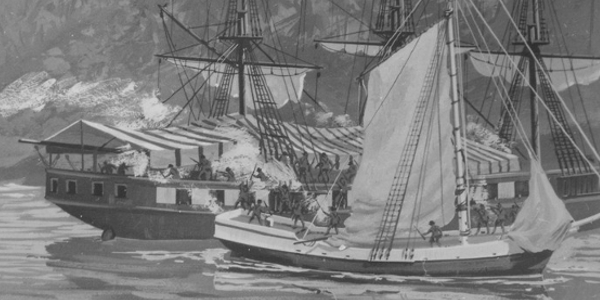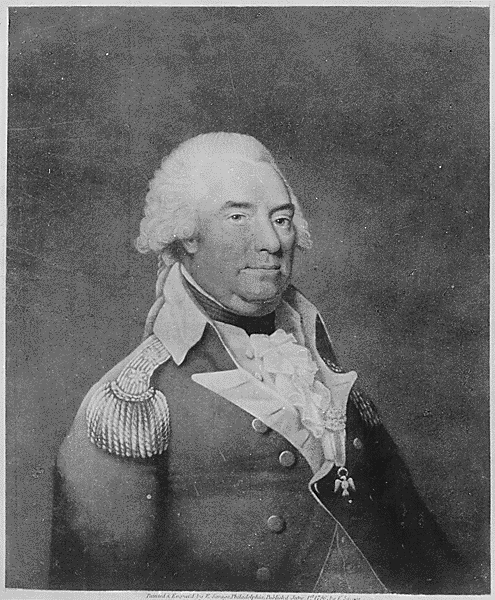Sponsor this page. Your banner or text ad can fill the space above.
Click here to Sponsor the page and how to reserve your ad.
-
Timeline
1798 Detail
July 7, 1798 - Congress voids all treaties with France
due to French raids on U.S. ships and a rejection of its diplomats, and
orders the Navy to capture French armed ships. Eighty-four French ships
are captured by the U.S. Navy (with 45 ships) and private ships (365).

Yes, the French had been in an alliance with the United States since
1778 and the winter encampment at Valley
Forge, loaning them money, coming to their rescue,
but this was a new France. The French Revolution had removed King Louis
XVI from power in 1792, and since this French government was not the
same French government from the days of revolution, the United States
decided to stop repayment of their debts to France. This did not go
over well. Add in the Jay Treaty and new trade alliances with Great
Britain, and the United States had a new dance partner, even though
that partnership would not last either.
In 1796, the new French government had had enough. Despite an avowed
neutrality in the war between France and Great Britain, French
privateers began to capture U.S. ships trading with England and sell
them to recover their debts and the French government refused to
receive U.S. diplomats. By July 1797, the John Adams administration,
wanting to negotiate peace, sent a delegation of three diplomats to
France. Agents of the French Republic demanded bribes and a loan before
negotiations would begin. This offended the United States. The brink of
war would follow.

How the Quasi War Starts
Even before the commission failed, President Adams called
for an increase in the United States military, including a twenty
thousand man Army and ships for the Navy. When word arrived of the
French call for bribes in March 1798, and disagreements over the
reaction by the President and less hawkish members of Congress ensued,
Adams released proof of the bribes with redacted names, substituting
XYZ for them. Even though Adams had not wanted a war reaction, it
followed. Congress authorized the building of twelve frigates,
cancelled the 1778 Treaty of Alliance on July 7, and two days later
authorized attacks on French warships when the President signed the
bill the Senate had passed 18 to 4. There was no formal declaration of
war; Adams had not asked for one. So the Quasi War began.
Full Text - An Act further to protect the Commerce of the United States.
Section 1. Be it enacted by the Senate and House of
Representatives of the United States of America in Congress assembled,
That the President of the United States shall be, and he is hereby
authorized to instruct the commanders of the public armed vessels which
are, or which vessels to shall be employed in the service of the United
States, to subdue, seize and take any armed French vessel, which shall
be found within the jurisdictional limits of the United States, or
elsewhere, on the high seas, and such captured vessel, with her
apparel, guns and appurtenances, and the goods or effects which shall
be found on board the same, being French property, shall be brought
within some port of the United States, and shall be duly proceeded
against and condemned as forfeited; and shall accrue and be
distributed, as by law is or shall be provided respecting the captures
which shall be made by the public armed vessels of the United States.
Sec. 2. And be it further enacted, That the President of the United
States shall be, and he is hereby authorized to grant to the owners of
private armed ships and vessels of the United States, who shall make
application therefor, special commissions in the form which he shall
direct, and under the seal of the United States; and such private armed
vessels, when duly commissioned, as aforesaid, shall have the same
license and authority for the subduing, seizing and capturing any armed
French vessel, and for the recapture of the vessels, goods and effects
of the people of the United States, as the public armed vessels of the
United States may by law have; and shall be, in like manner, subject to
such instructions as shall be ordered by the President of the United
States, for the regulation of their conduct. And the commissions which
shall be granted, as aforesaid, shall be revocable at the pleasure of
the President of the United States.
Sec. 3. Provided, and be it further enacted, That every person
intending to set forth and employ an armed vessel, and applying for a
commission, as aforesaid, shall produce in writing the name, and a
suitable description of the tonnage and force of the vessel, and the
name and place of residence of each owner concerned therein, the number
of the crew and the name of the commander, and the two officers next in
rank, appointed for such vessel; which writing shall be signed by the
person or persons making such application, and filed with the Secretary
of State, or shall be delivered to any other officer or person who
shall be employed to deliver out such commissions, to be by him
transmitted to the Secretary of State.
Sec. 4. And provided, and be it further enacted, That before any
commission, as aforesaid, shall be issued, the owner or owners of the
ship or vessel for which the same shall be requested, and the commander
thereof, for the time being, shall give bond to the United States, with
at least two responsible sureties, not interested in such vessel, in
the penal sum of seven thousand dollars; or if such vessel be provided
with more than one hundred and fifty men, then in the penal sum of
fourteen thousand dollars; with condition that the owners, and
officers, and crews who shall be employed on board of such commissioned
vessel, shall and will observe the treaties and laws of the United
States, and the instructions which shall be given them for the
regulation of their conduct: And will satisfy all damages and injuries
which shall be done or committed contrary to the tenor thereof, by such
vessel, during her commission, and to deliver up the same when revoked
by the President of the United States.
Sec. 5. And be it further enacted, That all armed French vessels,
together with their apparel, guns and appurtenances, and any goods or
effects which shall be found on board the same, being French property,
and which shall be captured by any private armed vessel or vessels of
the United States, duly commissioned, as aforesaid, shall be forfeited,
and shall accrue to the owners thereof, and the officers and crews by
whom such captures shall be made; and on due condemnation had, shall be
distributed according to any agreement which shall be between them; or
in failure of such agreement, then by the discretion of the court
before whom such condemnation shall be.
Sec. 6. And be it further enacted, That all vessels, goods and effects,
the property of any citizen of the United States, or person resident
therein, which shall be recaptured, as aforesaid, shall be restored to
the lawful owners, upon payment by them, respectively, of a just and
reasonable salvage, to be determined by the mutual agreement of the
parties concerned, or by the decree of any court of the United States
having maritime jurisdiction according to the nature of each case:
Provided, that such allowance shall not be less than one eighth, or
exceeding one half of the full value of such recapture, without any
deduction. And such salvage shall be distributed to and among the
owners, officers and crews of the private armed vessel or vessels
entitled thereto, according to any agreement which shall be between
them; or in case of no agreement, then by the decree of the court who
shall determine upon such salvage.
Sec. 7. And be it further enacted, That before breaking bulk of any
vessel which shall be captured, as aforesaid, or other disposal or
conversion thereof, or of any articles which shall be found on board
the same, such capture shall be brought into some port of the United
States, and shall be libelled and proceeded against before the district
court of the same district; and if after a due course of proceedings,
such capture shall be decreed as forfeited in the district court, or in
the circuit court of the same district, in the case of any appeal duly
allowed, the same shall be delivered to the owners and captors
concerned therein, or shall be publicly sold by the marshal of the same
court, as shall be finally decreed and ordered by the court. And the
same court, who shall have final jurisdiction of any libel or complaint
of any capture, as aforesaid, shall and may decree restitution, in
whole or in part, when the capture and restraint shall have been made
without just cause, as aforesaid; and if made without probable cause,
or otherwise unreasonably, may order and decree damages and costs to
the party injured, and for which the owners, officers and crews of the
private armed vessel or vessels by which such unjust capture shall have
been made, and also such vessel or vessels shall be answerable and
liable.
Sec. 8. And be it further enacted, That all French persons and others,
who shall be found acting on board any French armed vessel, which shall
be captured, or on board of any vessel of the United States, which
shall be recaptured, as aforesaid, shall be reported to the collector
of the port in which they shall first arrive, and shall be delivered to
the custody of the marshal, or of some civil or military officer of the
United States, or of any state in or near such port; who shall take
charge for their safe keeping and support, at the expense of the United
States.
Approved, July 9, 1798.
The Quasi War
With authorization to act, the U.S. Navy and over three
hundred privateers began patrolling the southern coast of the United
States. Prior to their engagement, the French had captured over two
thousand merchant ships. After the authorization, only one ship was
captured, and later recovered. The United States and their allies, the
British with some cooperation, but no coordination, did much better.
The USS Frigate Enterprise captured eight privateers and freed eleven
American merchant ships. The USS Constitution, Constellation, and
Boston were successful in subdueing French privateers from Delaware to
the Caribbean. Hostilities ended on September 30, 1800, with the
signing of the Convention of 1800, between the French government of
Napolean Bonaparte and the United States.
One quick note about the Quasi War. George Washington, past President,
was reinstated as Commander in Chief during the war by President John
Adams.
Photo above: Battle between the USS Constellation and the French
Frigate L'Insurgente on February 9, 1799, in the Quasi War, 1981, Rear
Admiral John William Schmidt, Navy History and Heritage Command via
Wikipedia Commons. Photo below: Capture of the French privateer
Sandwich by Marines on the Sloop Sally from the USS Constitution, May
11, 1800. Department of Defense via National Archives, Wikipedia
Commons. Info source: United States Congressional Serial Set, Issue
2516, Miscellaneous Documents of the Senate of the United States, 1888;
Wikipedia Commons; Wikisource; Acts of the Fifth Congress of the United
States; MountVernon.org.

Back to Index





